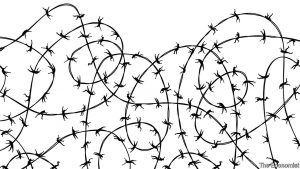134 Global News Post 3
fei111
UN human rights chief to visit China, including Xinjiang, in May by AFP in Geneva

The Economist (2020). [Cartoon illustration for article on human rights violation in Xinjiang:]. https://www.economist.com/leaders/2020/10/17/the-persecution-of-the-uyghurs-is-a-crime-against-humanity
On March 8th, Michelle Bachelet, the United Nations High Commissioner for Human Rights, announced that she had reached an agreement with the Chinese government to visit Xinjiang in May and investigate the alleged human rights violations. According to the spokeswoman at the Office of the United Nations High Commissioner for Human Rights( OHCHR), the Chinese government will “respect our methodology” and Michelle Bachelet will have “unfettered access ” during her visitation. In addition, prior to Michelle Bachelet’s visit in May, an advanced OHCHR team will arrive in China and conduct on-site visits and other necessary activities in preparation. The agreement was significant because it is the first time that China accepted a request from the United Nations High Commissioner for Human Rights to visit and investigate the alleged violations. Western diplomats and human rights activists have voiced their support for the agreement and called it “a positive development”. However, it is worth mentioning that diplomats and activists also noted that despite China’s concession, this should not obscure any other investigations by the United Nations on violations in Xinjiang. Specifically, they urged OHCHR to publish a report on human rights violations in Xinjiang drafted last August but had been withheld to prevent dissatisfying China.
The article is published by The Guardian, a British independent newspaper, and is authored by Agence France Presse in Geneva, a French private international news agency. The evidence used in the article is mostly reports and interviews from OHCHR or other articles published by The Guardian. Although the evidence is considered independent and reputable, the fact that The Guardian is from the United Kingdom might result in a certain pro-western bias. As a result, I think incorporating more evidence from China’s affiliated agencies or even non-western new papers such as Al Jazeera can provide different perspectives and allow the audience to have a more comprehensive understanding of the issue.
The article is important because it helped us understand China’s ongoing human rights violations in Xinjiang and provided important updates on the issue. It shows how aside from activists and western governments, the United Nations is also taking action to address these alleged human rights violations.